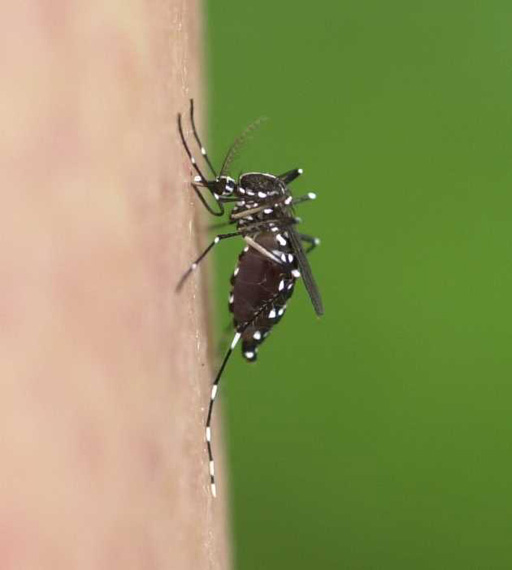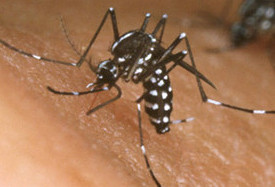Mike at Behnke’s in Beltsville in June
Mike will tell you everything you need to know to enjoy your best-tasting backyard tomatoes ever from 1:30 to 3 p.m. at Behnke’s 5th Annual Garden Party event on Saturday June 6. Find more information at Behnkes.com.
Does D.C. have a mosquito problem — or a people problem?
You may have heard the news story earlier this week on WTOP, announcing that Washington had been named the third worst city in America for mosquito misery, behind only Atlanta and Chicago. That sure seems right, doesn’t it? We have a lot of bodies of water in the area for mosquitoes to breed, and a notoriously muggy summer that provides the conditions they prefer.
But I always want to know how they figure things like this out. Did researchers set out traps, for instance, and record the average number of blood suckers captured per acre in an hour at peak season?
No. The ranking was instead based on the number of calls made by residents to Orkin, the company that issued the ranking, asking it to exterminate their mosquitoes.
That could mean we in the D.C. area have normal numbers of the biting pests, but some of the itchiest fingers in America on the pesticide triggers — despite the fact that spraying is the least effective method of mosquito control.
Mosquito Prevention 101: Stop their breeding now
A much smarter solution is to knock their numbers down now — early in the season — before the first couple of generations can breed into intolerable numbers. Female mosquitoes — the only ones that bite — only breed in standing water. And so everyone knows — or should know — that it’s important to empty out any old buckets or wheelbarrows around the home.
But females don’t need big water, and many people don’t recognize potential breeding areas right outside their own doors or literally under their noses.
For instance, females can breed many churlish children in the water that sits in saucers under plant containers, in the reservoirs inside those self-watering growing boxes and in something as small as a cat food can that dropped out of the recycling.
So go on a water run this weekend with new eyes. Look for small potential breeding containers and get rid of them. Get rid of the water holding sections of self-watering boxes and water your plants the old-fashioned way.
And remove those saucers under your containers for good; they’re only there to protect surfaces from water damage and you shouldn’t need them outside. All they do is breed mosquitoes and prevent the roots of your plants from drying out between watering. And yes, your plants’ roots do need to dry out between watering.
The unseen site where mosquitoes breed just feet away
Little-known fact: Most female mosquitoes stay very close to the water they hatched out of; they don’t fly very far from their ancestral homes. So the vast majority of mosquitoes that torment you in July and August were likely born on or near your house, perhaps in their greatest unseen breeding ground: Gutters clogged with leaf debris.
That moist debris — or even worse, badly angled gutters that don’t drain completely — can breed thousands of mosquitoes right over your head. Clean and/or repair those gutters now and you’ll break the cycle of biters this summer.
Really — late-season spraying is generally more toxic to you than to any mosquitoes, and this simple chore of eliminating all of the cheap motels at the roofline of your house can cut your summertime numbers dramatically.
Advanced mosquito prevention: Destroy their future
You’ve all seen those “mosquito dunks,” right? The little doughnut-shaped or charcoal briquette-shaped things you’re supposed to toss into ponds or abandoned swimming pools to prevent mosquitoes from breeding? They’ve available at virtually every hardware store and home center; I even see them in a lot of supermarkets.
Well, what you may not know is that they are 100 percent non-toxic as well as highly effective. Their active ingredient is BTI, a naturally occurring soil organism. It’s a variation (or more correctly, a different strain) of the Bt that kills pest caterpillars. Added to water, BTI prevents mosquito eggs from becoming biting adults.
And BTI is also available in granules, a form that makes it easy for you to trick the adults into laying eggs that will never hatch.
Here’s the strategy: Instead of getting rid of all your standing water outside, deliberately put out lots of standing water around your home: buckets, cans, wide-mouth jars, whatever you got: the more the better. Lace the water with BTI, either a handful of granules or a couple of pieces of busted-up dunks. Female mosquitoes will still lay their eggs in the water, but those eggs will never hatch.
Note: the dunks may be a little harder to use, but will last a lot longer. The granules will need to be freshened up at least once a week, so if you go with them, get a big container.
Trap them now and there’s no need to spray later
My suspicion is that the survey saying D.C. is a top mosquito city really means D.C. residents are among the fastest in the nation to call an exterminator to deal with mosquitoes. That exposes the caller to pesticides and does not control their mosquitoes well.
So put down that phone and pick up some BTI — an all-natural soil organism that prevents mosquitoes from successfully breeding in standing water. Use the BTI to make lots of the breeding traps we’ve described above. If you get most of the currently-alive female mosquitoes to lay their eggs in that water, they will die of old age without ever having children.
And those now-barren females were the source of over 90 percent of the mosquitoes that would have bothered you around your home this summer.
And BTI-treated water is safe for birds, pets and just about everything else besides mosquitoes.
Yes, your dog can drink some and not get sick, because your dog is not a member of the biting fly family.
Birds can come and drink the water and will not get sick, because birds are not members of the biting fly family. It won’t even harm bees or other insects — just mosquitoes, black flies and those annoying little biting gnats.
One of the best things about BTI is that it’s so specific; it is only toxic to blood-suckers. The same can not be said of those sprays you’d otherwise call for in summer.
And now we know that lots of you do call. You are busted, D.C.!







